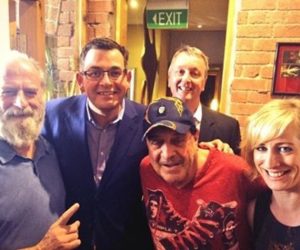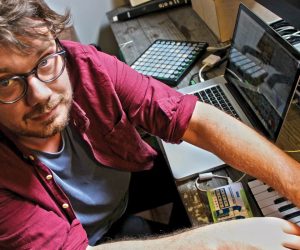
Gotye
After a big year – a single in the Top 10 of Triple J’s Hottest 100, and a management deal – Wally De Backer, aka Gotye, backs up and offers a recount.
Text: Mark Davie
It could be wrong to see someone’s passing as an opportunity for a new beginning, but the demise of Wally De Backer’s next-door-neighbour proved to be a career catalyst. The recent widower found himself with a stack of records that proved a bit too much for the bereaved. Memory serving him well, he had a young musician living next door; a knock at the door drew out a pre-Gotye De Backer. The elderly British gentleman, explaining his delicate situation and eagerness to get back to Old Blighty, offered De Backer his wife’s records that would otherwise have ended up on top of the Montmorency tip. Accepting the offer, the next day crates of records arrived on the front step of De Backer’s residence – a musical legacy from beyond the grave.
The vinyl library, still sitting on a bookshelf in De Backer’s home, is predominantly ’80s fare, with more than a few diamonds in the rough, including The Reddings track, In My Pants, a local favourite of De Backer and his housemates, and one that got plenty of airing during our two-hour chat. He admits that he’s always longed to play the track in a DJ set – something he’s been asked numerous times to do but never found the time for – possibly a good thing for the poor sod who commissions him.
Listening to Wally reflect on the history of Gotye, while at the same time smelling the fragrance of wood that permeates the De Backer chalet-style home (single-handedly built by his father), you get the feeling that this Flemish-Belgian sprite wasn’t raised a lazy lad. But like so many other success stories, it took fated intervention, get-up-and-go pep talks, persistent friends and allies, the right creative partner and the drive to keep him going. One thing that must be noted to get a fuller picture of De Backer’s resolve is that up until two weeks prior to our arrival, he had been entirely self managed, spending his own hard-earned on recording, mixing and promoting his two records: Boardface, and latest release, Like Drawing Blood. This latest album recently won the Triple J radio Listener’s Favourite Album of 2006 – no mean feat for any Australian independent artist. So, how does a young musician go from a few crates of records to national success? We found out.


BEGINNING WITH BOARDFACE
After early music-making turned to disappointment on more than one occasion, Wally realised that attempting insanely multi-tracked, complex, synth-laden, electro rock recorded in one day at the hands of local engineers wasn’t going to result in a finished product in the league of Flood or Daniel Lanois. Taking the lead from his Nine Inch Nails-influenced friend, Wally joined the legion of home studio owners. Figuring that he liked the sound of his friend’s tracks, the gear he bought was a carbon copy of that setup: a Pentium III 733MHz, Sound Forge, Acid Pro, an Isis MaxiStudio card, an Audio-Technica AT4033 and a Technics SL-1200 turntable. The first speakers he had were two old Thorn EMI boxes from the ’70s, shelling out a whole five dollars at Savers for the pair. “As long as there was sound coming out of them, it was alright,” reflects De Backer. “It was good enough – better than sitting there with headphones on.” A tent of mattresses served as a makeshift vocal booth, complete with a stocking/coat hanger pop filter. (If you want to get a better picture of the setup, head to www.gotye.com and click on visual for a 360-degree view of the old house.)
With a library of records and a home studio setup going begging, his friend Andy made a simple suggestion: start sampling some of the records – a thought that hadn’t occurred to De Backer, despite the fact that he was an ardent Portishead and Massive Attack fan. This same friend parked himself in De Backer’s bedroom one night and insisted they sample something.
Playing back the result of this first night’s work, consisting of a drum break with an alternating intervallic horn part, and of course, a solid hook snippet from the hugely-influential In My Pants, the interview almost ended in tears of laughter.
But the questions rolled on.
MD: Obviously you didn’t nail it the first time you sampled and used Acid, but it feels like there’s already a Gotye blueprint there.
WDB: Yeah maybe. This was one track of five or six that I initially made and started sending to people. Those other tracks didn’t make it on to Boardface because at that stage I was still trying to find what it was I should be developing, and what worked best. That tune works because of the vocal element, but I was doing more DJ-style cut-up stuff, where I was sampling other people’s vocals. When I had about 25 songs finished I had to choose a 10-song album, and I went with all the vocal stuff. They were the most original to me.
MD: So you identified the vocals as the defining element?
WDB: Those were the things that people were mostly responding too… on these songs anyway. And some of the other tracks didn’t interest me as much anyway. Or maybe it was just chance that some of them didn’t feel like they were produced as well as some of the other tracks that I’d spent more time doing vocals on.
MD: So how much did a program like Acid, in those formative days, lead the way in producing the tracks? Or did you have something in mind early on, like Portishead, and say, ‘well, how can I make this work for me?’
WDB: I think I knew very little, and I think I still know very little. I felt a bit bamboozled. I think the Acid software definitely directed me in developing songs a certain way, especially from loops and grabs. But I think I realised fairly quickly – maybe more so than some people who make dance music using this type of software – that it pushes you into doing more looped, four bar, eight bar kind of stuff. And I just try and find ways to shift out of that and make things more organic. Go beyond the grid, I guess.
I just try and find ways to shift out of that and make things more organic. Go beyond the grid, I guess

LEARNING ON LIMITED EARNINGS CURVE
It’s not all laughter and high fives though. Cardinal mistakes have been made along the way, as will inevitably happen to any cash-strapped musician eager to get his music to the masses. The learning process included paying two different mastering engineers to each work on half of his first album, Boardface (a self-confessed faux pas), not realising that mastering is intended (at least in part) to help an album gel together. The situation was further exacerbated by the frustrating lack of support from (supposedly) interested independent record labels that insisted the disc be remastered, backing the suggestion up with zero-dollar budgets and zero suggestions of whom that mastering engineer might be.
With no release slated and the record ready to go, the next step seemed to be tantalisingly out of reach, until the intervention of yet another friend inspired De Backer to take this next step himself. He recounts the pep talk like it was yesterday: “It took a friend who said, ‘you can put records out yourself. If you’re prepared to invest in it, you can press stock, put it out, and send it to people… if you’re prepared to spend the time’. That was a momentous afternoon session, having a coffee, going, ‘Yeah, I can do this’.”
Wally’s focus then turned from music creation to music distribution, spending as much time making CDs and mailing them to radio stations as he did tinkering on Acid. And it worked.
THE PERFECT PAIRING
Moving on from the entirely self-produced, engineered and mixed process of the first album, the second release, Like Drawing Blood, afforded a different approach. Retaining the same gear, De Backer tracked to Acid, arranged and rough mixed, then took the songs to François ‘Franc’ Tetaz of Moose Mastering to mix the final product. The combination worked extremely well for the sample-based Gotye songs. Franc’s mastering skills came in handy when mixing the individual tracks, removing or reducing the artefacts on individual vinyl samples and fixing tuning issues before they became constrained to a stereo two-track master.
“There’s definitely a lot of production elements Franc brought to it,” says De Backer as he pulled up the Acid file of last year’s hit, Heart’s a Mess, to show the pre-Franc mix. “Some of the songs I would take to Franc with effects printed, like vocals on Learnalilgivinanlovin. I went to town trying Quadrafuzz plug-ins and all other sorts of things to try and emulate ’60s desk tube distortion and reverbs. I printed all of those and took them to him, and I also took dry parts, but he ended up working with the effected tracks and just used some compression and EQ. Heart’s a Mess was one of the last tracks mixed on the album, so I think I had an idea what I wanted Franc to do with it by that stage. But I didn’t print any effects from home, I just kind of new the space I wanted to create with it.” (Read Franc’s comments on the mixing process in the sidebar back on page 49.)
ARRANGING THE MESS
It’s one thing to have a library of ’80s pop at your disposal, but managing such a vast collection and arranging them into songs that work is quite another. Heart’s A Mess took the longest to make it through this process, with a gestation period of five house moves. The first loop that kick-started the track was the plodding rhythmic bass line. Over the next year he added the verses and pre-chorus of the song. But right up until doing the premixes on the album he still didn’t have a chorus. So he attempted something he hadn’t done before and went to a piano to try another section for the song.
“Actually it was on that little Kawai keyboard I’d had since I was six years old,” De Backer says, as he points to a pile of gear in the corner. “I didn’t know what key signature it was in yet. So I worked out it was in F-minor, plonked F-minor down, and worked out what I thought was a really obvious chord progression. I didn’t know how I was going to put this chorus I’d made on this dinky little instrument into Acid where I’d already laid down the spaces and sounds I wanted. So to realise the chorus, I pitch-shifted the bass note of the main loop around, put some temporary piano down to sing to and multi-tracked the part straight into the sound card, just two days before we did the final mix.
“I knew I wanted strings backing it up, so I went into Crazy Links and got all these classical records just to find individual snippets of string sounds and single notes, which I then cut and pitch-shifted to create my own string sampler.”

FIX IT IN MASTERING?
MD: How did the experience with Franc alter your production methods, if at all?
WDB: I didn’t take Franc any half-baked ideas or tracks, which I think was important, but if I was to work with Franc again – which I’d love to do – I think I’d like to bring him in a little earlier for some advice, even with arranging strings and recording them, rather then stuffing around sampling them.
MD: I can understand chopping up string samples, but as an accomplished drummer, don’t you find it annoying having to spend days chopping up drum samples?
WDB: No. I actually find it exciting. If you’re not too focused on ‘what am I going to do with this?’ you’ll honestly come up with things you would never have thought to do on the drum kit. It’s about a timbre. Regardless, I don’t think I have the means to record the things I want on drums. I struggle to get my drum kit to sound the way I’d like it to. I didn’t have the drum mic setup, nor could I afford to hire the mics.
MD: Talking about the next progression, including recording some strings and elements and getting Franc to add some expensive effects, does it worry you that the vibe you have now might evolve into something that’s too ‘polished’?
WDB: A little bit. I’m interested to find out how I’ll go making the transition to another setup – which I intend to do – whether I’ll feel comfortable working with different software or if I should just stick with the current limitations. But I think it’ll be exciting to find new ways of getting vibes, because otherwise I’ll probably just end up doing the same thing. I’d just love to have a bit more of a mixed approach. I think the sample-based element is just how I make this type of music, and it’s what makes me most excited about it.
I don’t feel as excited about standing up in front of 6000 people, who have clearly been listening to my record and seem to be appreciating it, as listening to a record finding a bit, putting it down and thinking ‘that’s so cool’, and starting to write a song. That makes me a lot more excited.
MD: Well I think a lot of our readers would probably empathise with you there… even if they haven’t had the chance to stand in front of 6000 people.
WDB: I feel like I haven’t done anything musical for almost a year. Maybe it works for me to have a downtime period, where I’m building up this real desire. I’m hoping I get the chance soon to stop doing interviews (laughter), put all my current records in another room, and fill my rack with some new ones!
[…Watch out grannies, Wally’s looking for some new records.]
















RESPONSES